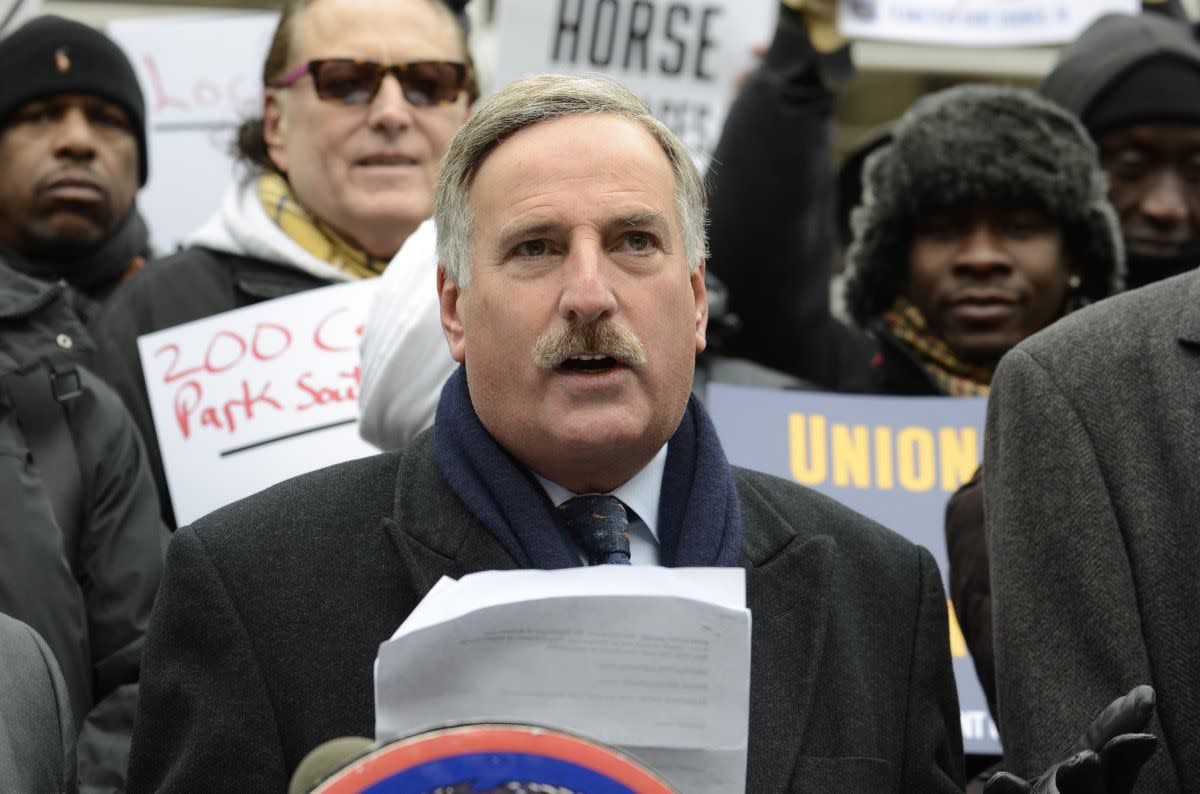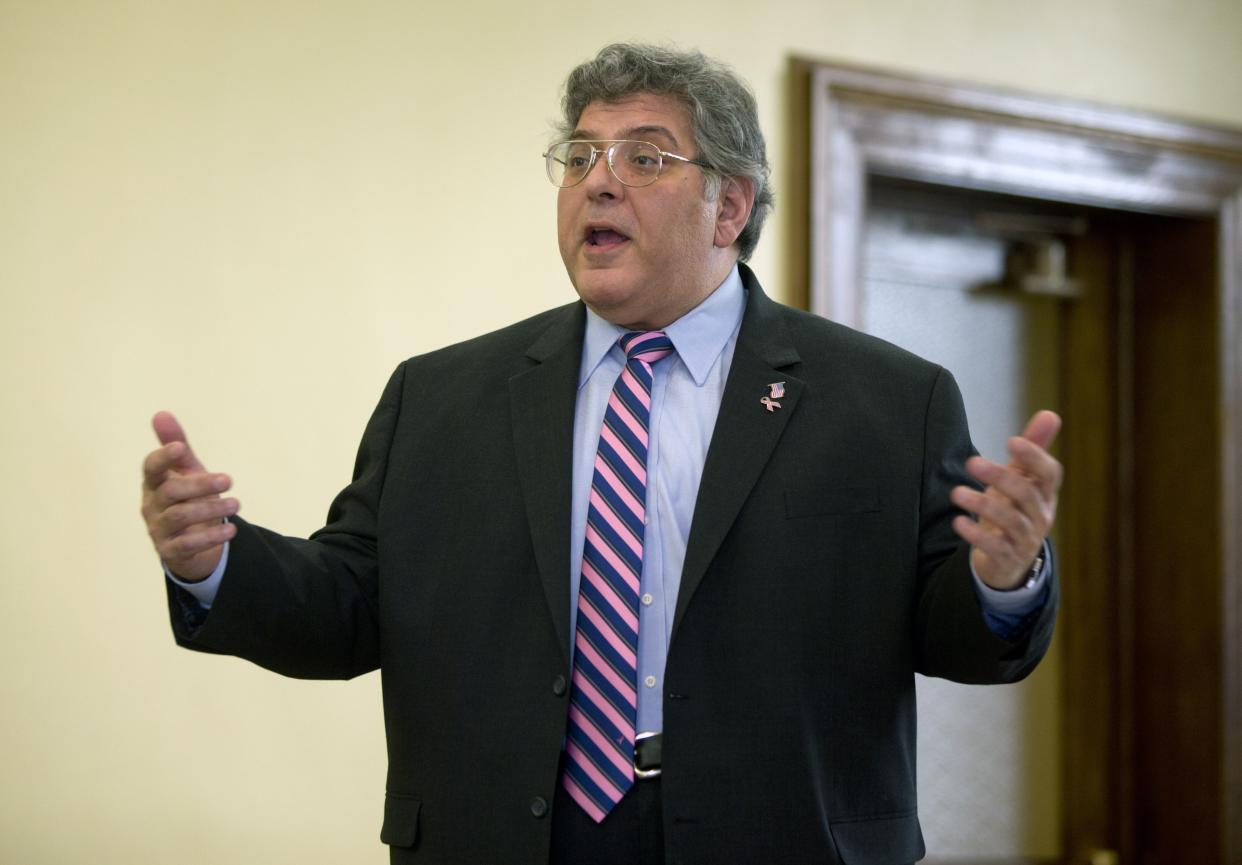NYC Comptroller candidate Dave Weprin’s use of campaign cash to pay fine is ‘not permissible’: election lawyer
City comptroller candidate and state Assemblyman David Weprin took seven years to fully pay off a six-figure debt to the city’s Campaign Finance Board — and when he finally did, he used money raised through his state political fund.
That could be a problem, according to some legal and ethics experts.
Weprin’s day-late, dollar-short saga began more than a decade ago after his first run for the comptroller’s office in 2009.
After losing that bid, the Campaign Finance Board examined his fundraising apparatus and in a 2013 report determined he’d have to fork over $28,184 in fines and return more than $319,000 in public matching funds.

Weprin is once again running for comptroller, the city’s top fiscal watchdog job with oversight over city finances and the city’s gigantic pension funds.
His opponents include City Council Speaker Corey Johnson, Councilman Brad Lander, state Sens. Brian Benjamin and Kevin Parker, as well as former journalist Michelle Caruso-Cabrera.
In 2013, Weprin got hit with the big cash penalty for accepting 31 over-the-limit campaign contributions, for taking money from unregistered political action committees and for “making improper post-election expenditures,” the CFB found in its January 2013 determination.
As a result, the board ordered him to repay $319,711 in public matching funds — for a total debt of $347,895. It found that many of the donations his campaign identified as eligible for a match were invalid because contributions were placed in a separate campaign account without following appropriate CFB accounting safeguards.
In one Jan. 15, 2013 missive sent to Weprin’s 2009 campaign, the CFB noted that full payment of the debt was required by Feb. 14, 2013 and that the candidate “will not be eligible to receive public funds for any future election until the full amount is paid.”
Weprin paid off the $28,184 fine in 2013, with state campaign finance records showing an expenditure for that exact amount listed as coming from his state Assembly campaign fund in February of that year.
Campaign Finance Board documents that Weprin signed to qualify for matching funds also require he and others affiliated with his city campaign acknowledge personal responsibility for any fines incurred.
That, said election lawyer John Ciampoli, could pose a legal problem for Weprin because while state election law allows candidates to use state campaign finance cash to pay off fines in connection to an election, it does not permit them to do so to pay down personal liabilities.
“Paying fines out of campaign funds is not permissible. When you’re paying fines you’re personally responsible for, it’s absolutely illegal,” said Ciampoli, a former counsel to the state Board of Elections.

Weprin’s attorney and election law expert Marty Connor offered a different legal perspective. He said that paying off the fine with money from Weprin’s state Assembly account does not constitute a personal use of campaign money.
“You can use it in connection with anything arising out of a political campaign,” he said.
After making the initial payment with cash raised through his state campaign account, Weprin allowed the remainder of the debt — which constituted the matching funds he had to return — to linger for years. But to qualify for future matching funds in his second bid for comptroller, he was required to pay down the rest of that debt to the Campaign Finance Board.
When he did, the remaining $319,711 once again came from his Assembly campaign account, state records show.
Using that money to pay off the debt is ethically problematic, according to John Kaehny of the government watchdog group, Reinvent Albany.
“I don’t see how it’s okay,” he said. “That’s a problem. It’s unethical. It’s not why people contributed to his state account.”
The debt, Kaehny said, essentially amounts to a city campaign expense and noted that there’s a prohibition against using state campaign funds for a city-run.
“If it’s not a campaign expense and it’s a loophole, they have to close it,” he added.

Ciampoli said the second payment to the CFB essentially amounts to a campaign contribution because it was used to pay off an expense incurred by his initial comptroller’s campaign. As such, he said, it “would clearly violate contribution limits.”
Connor differed with both Ciampoli and Kaehny on this point as well.
“Mr. Weprin’s committee was never obligated to pay the remaining balance unless and until it decided to participate in matching programs for another citywide race, which the committee did, in fact, pay,” he said. “Furthermore, there is absolutely no preclusion in state law in using state campaign funds for this purpose, a fact confirmed by the CFB’s Deputy General Counsel, Bethany Perskie.”
To support that point, Connor shared an Oct. 9, 2020 email he received from Perskie stating that “the CFB does not object to Mr. Weprin using funds from his Assembly committee to pay off the remaining public funds repayment owed.”
The state Board of Elections did not respond to messages.
Campaign Finance Board spokesman Matt Sollars declined to comment on the specifics of Weprin’s situation, but noted that “city law requires candidates to pay off all outstanding debts from previous elections before they can be eligible to receive matching funds.”
“The CFB monitors state committee accounts to ensure they are not used on an active city campaign,” he added. “As long as a state committee’s funds are not used directly to further a candidate’s election to city office, city law does not govern how a state committee uses its funds.”
Weprin first formally registered his 2021 comptroller run with the city CFB in April of 2019.
So far, he has received more than $1.5 million in matching funds from the city for his current comptroller run — funds he would not have been eligible for unless he paid off his prior debt last December.
Check out our special section for the latest news on the critical 2021 elections in NYC. And to have the essential news and analysis sent to your inbox, sign up for our Campaign Diaries newsletter.






